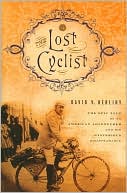Expat: Women's True Tales of Life Abroad
For generations, literary figures from Ernest Hemingway to Frances Mayes have fueled our fantasies about the romance of expatriate life. But it's one thing to dream about living abroad and quite another to actually do it. In Expat a diverse group of women explores in vivid detail how the reality of life abroad matches up to the fantasy. Tonya Ward Singer craves a roasted chicken in China and must buy it alive and kicking. Karen Rosenberg reevaluates both her family's Judaism and her own when...
Search in google:
For generations, literary figures from Ernest Hemingway to Frances Mayes have fueled our fantasies about the romance of expatriate life. But it’s one thing to dream about living abroad and quite another to actually do it. In Expat a diverse group of women explores in vivid detail how the reality of life abroad matches up to the fantasy. Tonya Ward Singer craves a roasted chicken in China and must buy it alive and kicking. Karen Rosenberg reevaluates both her family’s Judaism and her own when invited to a Passover seder in a remote Japanese village. Mandy Dowd tries to teach the French about Thanksgiving. Emily Miller admits that in Italy she craves the Hollywood entertainment she generally deplores when on U.S. soil. Tall and fair, Meg Wirth tries hard to blend in, in Borneo—to no avail. Expat taps into the bewilderment, joys, and surprises of life overseas, where challenges often take unexpected forms and overcoming obstacles (finding Drano in Ukraine, shrimp paste in Prague) feels all the more triumphant. Featuring an astonishing range of perspectives, destinations, and circumstances, Expat offers a beautiful portrait of life abroad. Library Journal Tourists merely visit, but expatriates get to live in another culture. Some of the women represented in this collection of 22 "tales" have lived abroad as students, teachers, or aid workers, while others either pursued career opportunities or fulfilled a romantic fascination with a particular country or culture. Motivation aside, almost all have chosen to relate experiences of vulnerability and unease and a nostalgia for the culturally familiar. An expat living in appliance-deprived China recounts her craving for and courageous attempt at roasting a chicken, while another in Prague relates the challenge of finding fresh produce in order to cook a chicken stir-fry. Yet another, in the south of France, homesick for Thanksgiving turkey, describes the troubles she had concocting such a dinner for acquaintances. Others are disheartened to discover that not all Australians have an abiding love for Yanks, that not everyone in Greece, Borneo, or Japan speaks English, and that most cultures have distinctive cues or codes that the foreigner will inevitably misinterpret. Most of the reporting is of disillusionment and cultural dissonance-cautionary tales for all who believe the global village is America. Recommended for public libraries.-Lonnie Weatherby, McGill Univ. Lib., Montreal Copyright 2002 Cahners Business Information.
\ Library JournalTourists merely visit, but expatriates get to live in another culture. Some of the women represented in this collection of 22 "tales" have lived abroad as students, teachers, or aid workers, while others either pursued career opportunities or fulfilled a romantic fascination with a particular country or culture. Motivation aside, almost all have chosen to relate experiences of vulnerability and unease and a nostalgia for the culturally familiar. An expat living in appliance-deprived China recounts her craving for and courageous attempt at roasting a chicken, while another in Prague relates the challenge of finding fresh produce in order to cook a chicken stir-fry. Yet another, in the south of France, homesick for Thanksgiving turkey, describes the troubles she had concocting such a dinner for acquaintances. Others are disheartened to discover that not all Australians have an abiding love for Yanks, that not everyone in Greece, Borneo, or Japan speaks English, and that most cultures have distinctive cues or codes that the foreigner will inevitably misinterpret. Most of the reporting is of disillusionment and cultural dissonance-cautionary tales for all who believe the global village is America. Recommended for public libraries.-Lonnie Weatherby, McGill Univ. Lib., Montreal Copyright 2002 Cahners Business Information.\ \ \ \ \ Kirkus ReviewsOften amusing, sometimes disconcerting reminiscences from 22 American women who uprooted themselves to live at least temporarily in a foreign country. Many set off hoping to shake too-comfortable habits and the confining expectations of life at home, often jump-starting unexplored talents and inner resources as a result. From Belfast to Belize, with stops in South America, Australia, and Ukraine, these travelers report on the challenges of new language, new customs, new smells and tastes, new biases. Some of them tried to fit in. Medical worker Meg Wirth, tall and “white as a ghost” in Borneo, couldn’t hide her height in a land of small, dark people, but tried to disguise her pale skin under an umbrella. Some couldn’t fit. Small, dark Angeli Primlani, fleeing domestic violence in her small southern town, moved to Prague, where she was ostracized and spit on because she looked suspiciously like a gypsy. For Kate Baldus, a hard-to-find blanket was her talisman against both the chill and the strangeness of Bangladesh. Other adventurers describe fending off bouts of homesickness with food: a disastrous home-cooked Thanksgiving meal in France, a Jewish seder in Japan, an attempt to re-create Mom’s rosemary chicken with a live bird and a balky toaster oven in China. Funniest perhaps is Rhiannon Paine’s wry take on adapting American ways and language to life in Liverpool, England. Many of these wanderers subsidized their new lives as teachers of English. Some were exploring family connections; a few had romantic visions, like Marci Laughlin coming to Greece in search of Zorba. (Lonely and unable to adapt, she never did dance on the beach.) For most, what turned an often-daunting experiment intosuccess was, as hackneyed as it sounds, a sense of humor and friends who accepted them at face value and tolerated their fumbling attempts at speaking the language. Will resonate for former expats, and wannabes may pick up some useful tips.\ \








